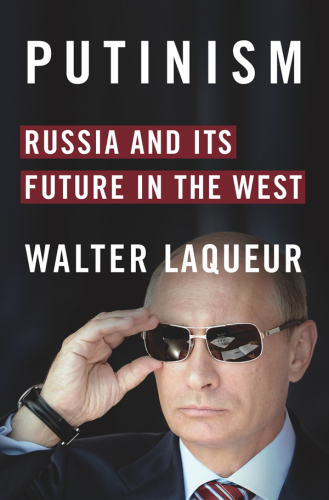
Putinism
Russia and Its Future with the West
کتاب های مرتبط
- اطلاعات
- نقد و بررسی
- دیدگاه کاربران
نقد و بررسی

April 20, 2015
Veteran foreign affairs writer Laqueur (After the Fall) provides an incisive look at recent Russian history and Vladimir Putinâs role in it, a topic that could hardly be more timely given recent events in Ukraine. Laqueur makes the depressing observation that the KGB, and even Stalin himself, have been rehabilitated in Russian public opinion, and he doesnât offer much hope for an imminent change in direction for the countryâs policy or political culture. According to him, âRussia has given up attempts to become part of the West,â which most Russians view as being âin retreat.â The most intriguing section is a chapter entitled âThe Pillars of the New Russian Idea,â which takes a multidimensional look at the forces shaping the country today. Readers hoping for specific predictions will be disappointed, though Laqueur is grimly convincing in lowering expectations that Russia will become genuinely democratic any time soon. This thorough examination of all aspects of modern Russian society and culture makes an excellent addition to recent literature on Putin-era Russia.

Starred review from May 1, 2015
Relief at the end of the Cold War lasted barely a decade before observers began wondering if it was returning, this time under a pugnacious, quasi-Stalin: Vladimir Putin. This is not true, writes distinguished historian Laqueur (After the Fall: The End of the European Dream and the Decline of a Continent, 2012, etc.), but no one should take comfort. In this astute, timely analysis of recent Russian politics and ideology, the author, former longtime director of the Institute of Contemporary History in London, emphasizes that the dissolution of the Soviet Union produced an unreasonable optimism about the chance for democracy. "Most Russians have come to believe that democracy is what happened to their country between 1990 and 2000," writes the author, "and they do not want any more of it." When Putin came to power in 2000, he seemed like a tough leader determined to stabilize a nation mired in chaos and economic collapse. No one denies his spectacular success, but the resulting "Putinism"-a mixture of chauvinism, social conservatism, state capitalism, government domination of the media, and the pervasive sense of a nation surrounded by enemies-brings to mind the Soviet Union. In fact, Russia's leaders believe that "the victory of the Reds in the civil war was a disaster," and they hold a low opinion of Lenin. Although admitting that Stalin committed too many unjustifiable actions during his time in power, they admire him because he made his nation strong. Minus the mass murder or any pretense of internationalism, that is Putin's goal as well. An erudite and unsettling but convincing argument that the new Russia is a dictatorship "approved by the majority as long as the going is good," and if Putin were to vanish today, his successor would make few changes.
COPYRIGHT(2015) Kirkus Reviews, ALL RIGHTS RESERVED.

May 15, 2015
The recent efforts by Russia's Putin to reassert power in Georgia and the Ukraine, combined with increased repression of domestic opposition, has dashed and probably doomed hopes that Russia could be a partner in the Western community of nations. So the key question must be asked: What does Putin want and how does he intend to gain his objectives? The question is eloquently addressed by Laqueur, one of the most widely respected experts on Soviet and Russian history. First, Laqueur dismisses the oft-repeated description of Putin as a KGB thug. He is best understood as an authoritarian Russian nationalist, and his views are very much aligned with those of most Russians and spring out of long-standing attitudes that are rooted in the nineteenth century. These include a sense that Russia is different than the West and resentment over the West's prosperity. Laqueur does not offer definitive responses to this newly assertive Russia, but his analysis of the problem is cogent and must be seriously considered in formulating a workable foreign policy toward Russia. HIGH-DEMAND BACKSTORY: The author is an eminent historian with a popular following, so expect demand for this very timely book.(Reprinted with permission of Booklist, copyright 2015, American Library Association.)

January 1, 2017
Journalist and historian Laqueur assesses the varied influences on Putin's philosophy of governance including the Russian Orthodox Church, the country's Islamic regions, Eurasianism, and Russophobia (anti-Russian sentiment). A timely look at recent Russian history. (LJ 1/15)
Copyright 2017 Library Journal, LLC Used with permission.

January 1, 2015
Distinguished historian Laqueur starts this assessment of what Vladimir Putin means for the future with the collapse of the Soviet Union. Then he works his way back to Stalin and considers key issues like Eurasianism and Russia's new nationalism before summing up possible flashpoints, e.g., imperial tendencies, Russophobia, and upheaval in central Asia.
Copyright 2015 Library Journal, LLC Used with permission.

























دیدگاه کاربران